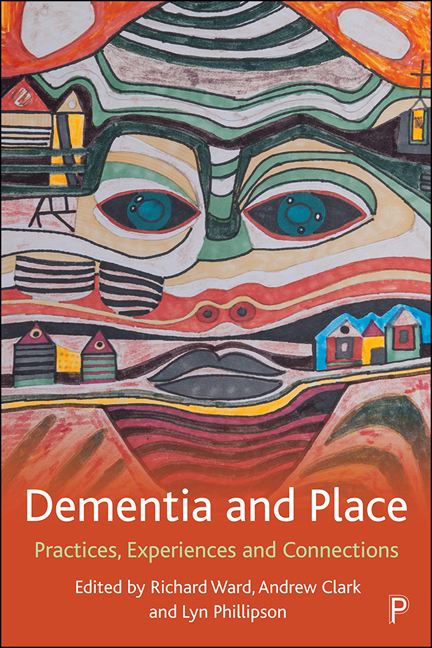Book contents
- Frontmatter
- Dedication
- Contents
- List of figures and tables
- Notes on contributors
- Acknowledgements
- 1 Introduction: Placing dementia
- 2 Understanding the meaning of neighbourhoods for people living with dementia: the value of a relational lens
- 3 Moving house with dementia
- 4 How do people with dementia manage problematic situations in public spaces?
- 5 Making and maintaining neighbourhood connections when living alone with dementia
- 6 My neighbourhood, my future ...?
- 7 Enabling the neighbourhood: a case for rethinking dementia-friendly communities
- 8 A conceptual framework of the person– environment interaction in the neighbourhood among persons living with dementia: a focus on out-of-home mobility
- 9 We’re known as ‘the girls’ around town: support, isolation and belonging for a lesbian couple living with dementia
- 10 Building community capacity for dementia in Canada: new directions in new places
- 11 The good, the challenging and the supportive: mapping life with dementia in the community
- 12 Growing back into community: changes through life with dementia
- 13 Dementia, tourism and leisure: making the visitor economy dementia friendly
- 14 Conclusion: Dementia emplaced
- Index
11 - The good, the challenging and the supportive: mapping life with dementia in the community
Published online by Cambridge University Press: 13 May 2022
- Frontmatter
- Dedication
- Contents
- List of figures and tables
- Notes on contributors
- Acknowledgements
- 1 Introduction: Placing dementia
- 2 Understanding the meaning of neighbourhoods for people living with dementia: the value of a relational lens
- 3 Moving house with dementia
- 4 How do people with dementia manage problematic situations in public spaces?
- 5 Making and maintaining neighbourhood connections when living alone with dementia
- 6 My neighbourhood, my future ...?
- 7 Enabling the neighbourhood: a case for rethinking dementia-friendly communities
- 8 A conceptual framework of the person– environment interaction in the neighbourhood among persons living with dementia: a focus on out-of-home mobility
- 9 We’re known as ‘the girls’ around town: support, isolation and belonging for a lesbian couple living with dementia
- 10 Building community capacity for dementia in Canada: new directions in new places
- 11 The good, the challenging and the supportive: mapping life with dementia in the community
- 12 Growing back into community: changes through life with dementia
- 13 Dementia, tourism and leisure: making the visitor economy dementia friendly
- 14 Conclusion: Dementia emplaced
- Index
Summary
Introduction
Developing bodies of work in interdisciplinary dementia research are engaging with concepts of place and spatiality as they relate to the everyday experience of living with dementia (Clarke and Bailey, 2016; Odzakovic et al, 2018). Rather than focus on the ‘dis-abilities’ of a person and their effect on navigation or wayfinding, these works have looked first to understand environmental barriers and to improve the enabling characteristics of environments – through features such as signage, pathways and distinctiveness (Mitchell and Burton, 2010). Building upon understanding the role of material geographies is work that engages with more progressive understandings of neighbourhoods as spaces of lived experience, belonging and relational ties (Ward et al, 2018; Clark et al, 2020). This evolving understanding of the vital importance of place and space for people with dementia is in contrast to a spatial literature where the relationship of people with dementia to space was pathologised – for example the reframing of the everyday practice of walking as a form of deviant wandering (Brittain et al, 2017). Rather than support mobility, a pathologising spatial lens problematises outdoor mobility for people with dementia as a health and safety risk and a social burden (MacAndrew et al, 2018). For those receiving a dementia diagnosis, notions like ‘prescribed dis-engagement’ (Swaffer, 2015) can foreclose possibilities for continuing involvement in the everyday spaces of community life. This prevalent narrative within the medicalised model sees dementia as a disease without a cure, with many medical practitioners accompanying diagnoses with instructions to abandon activities that are crucial to well-being and personhood and focus instead on end-of-life affairs and a potential trajectory of suffering.
People living with dementia have the right to freedom of movement and liberty and to be supported to maintain an ‘activity space’ (Hägerstrand, 1970) of regular social activities and movement within their neighbourhoods (Cahill 2018; Steele et al, 2019). These rights are being demanded through dementia activism and a closer alignment with the disability rights movement (Thomas and Milligan, 2018; Shakespeare et al, 2019). A new commitment to inclusion is also evident in some expressions of the international Dementia Friendly Communities (DFC) movement (Alzheimer's Disease International, 2017).
- Type
- Chapter
- Information
- Dementia and PlacePractices, Experiences and Connections, pp. 160 - 185Publisher: Bristol University PressPrint publication year: 2021



